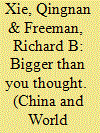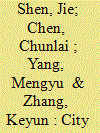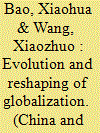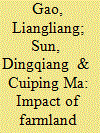|
|
|
Sort Order |
|
|
|
Items / Page
|
|
|
|
|
|
|
| Srl | Item |
| 1 |
ID:
164718


|
|
|
|
|
| Summary/Abstract |
China's advance to the forefront of scientific research is one of the 21st century's most surprising developments, with implications for a world where knowledge is arguably “the one ring that rules them all.” This paper provides new estimates of China's contribution to global science that far exceed estimates based on the proportion of papers with Chinese addresses in databases of international journals. Address‐based measures ignore articles written by Chinese researchers with non‐Chinese addresses and articles in Chinese language journals not indexed in those databases. Taking account of these contributions, we attribute 36 percent of 2016 global scientific articles to China. Taking account of increased citations to Chinese‐addressed articles relative to the global average as well, we attribute 37 percent of global citations to scientific articles published in 2013 to China. With shares of articles and citations more than twice its share of global population or GDP, China has achieved a comparative advantage in knowledge that has implications for the division of labor and trade among countries and for the direction of research and of technological and economic development worldwide.
|
|
|
|
|
|
|
|
|
|
|
|
|
|
|
|
| 2 |
ID:
164723


|
|
|
|
|
| Summary/Abstract |
This paper investigates the impact of China's city size and urban population concentration on city productivity by developing a distinctive index based on global nighttime light data. Using the panel data of 280 prefecture cities from 2004 to 2013 and employing dynamic system generalized method of moments and panel threshold model regression techniques, our results show that city size has a positive impact on city productivity; therefore, cities in China still have the potential to expand. While moderate urban population concentration can benefit city productivity, excessively concentrated urban population distribution may impede the growth of city productivity. We also find that the level of labor income significantly affects the impacts of urban agglomeration on labor productivity. Therefore, our results imply that city development policies should focus more on how to appropriately allocate economic activities and adjust population distribution in urban areas according to different stages of economic development.
|
|
|
|
|
|
|
|
|
|
|
|
|
|
|
|
| 3 |
ID:
164720


|
|
|
|
|
| Summary/Abstract |
With the weakening role of the World Trade Organization multilateral trading system, the globalization pattern is moving toward regional economic integration. As a result, the number of regional trade agreements (RTAs) has rapidly increased. New trends in international economics and trade, such as the withdrawal of the US from the Trans‐Pacific Partnership and the trade disputes between the US and China, have revealed the intention of the developed countries represented by the US to reshape the direction of globalization. This paper combines the relevant research conclusions and current stylized facts to examine the evolution and reshaping of globalization. We find that: (i) countries have different attitudes toward the recent round of globalization, which are related to changes in the patterns of income distribution within countries caused by the last round of globalization; and (ii) regional economic development is an effective way to reshape globalization. The self‐strengthening effect of the hub country in the trade network has promoted global RTA expansion.
|
|
|
|
|
|
|
|
|
|
|
|
|
|
|
|
| 4 |
ID:
164722


|
|
|
|
|
| Summary/Abstract |
There is growing concern that farmland transfers lead to less agricultural investment, which may adversely affect agricultural productivity growth in China. Prior research has primarily focused on the differences between owned cultivated land and rented plots, but little is known about how farmland transfers between relatives, which are popular in rural China, specifically affect agricultural investment. In this paper, we present a conceptual framework of transaction cost economics to compare different contracting strategies in China's farmland rental markets. As farmland rental markets in China are immature, land transfer between relatives establishes bilateral governance, which has the advantage of addressing the opportunistic activities of both parties and can ultimately increase investment by tenants. Based on data from two waves of household surveys, we empirically examine the impact of bilateral governance on the application of organic fertilizer, an indicator for agricultural investment. Our findings show that apart from economic factors, kinship is important to the functioning of farmland rental markets in rural areas.
|
|
|
|
|
|
|
|
|
|
|
|
|
|
|
|
| 5 |
ID:
164719


|
|
|
|
|
| Summary/Abstract |
This paper investigates the inequality of opportunity in China's labor earnings, defined as the component of inequality determined by personal circumstances that lie beyond the control of an individual, of which gender is one, as opposed to the component determined by personal efforts. Using the Survey of Women's Social Status in China (2010), we measure the share of inequality of opportunity in the total inequality of individual labor earnings for people aged 26–55 years, and separately for six birth cohorts and for female and male subsamples. Gender is revealed as the single most important circumstance determining nationwide individual labor earnings, with one's region of residence, father's occupation, father's education, birth cohort and holding rural or urban hukou also playing significant roles. A further investigation into the roles of circumstances and personal efforts (including education level, occupation, Communist Party membership, migration and marital status) confirms that circumstances play an alarmingly high role in shaping labor earnings distribution in China, and reveals notable gender differences that cannot be attributed to personal effort alone. These results provide the basis for recommending ways to improve gender equality of opportunity in the future.
|
|
|
|
|
|
|
|
|
|
|
|
|
|
|
|
| 6 |
ID:
164721


|
|
|
|
|
| Summary/Abstract |
Under pressures related to economic growth and environmental protection, China is facing an increasingly severe “environment–health–poverty” trap risk. Fuel taxation is generally considered an effective policy to counter such a risk. Since 2009 China has raised the fuel tax rate many times to enhance tax reform. However, the effects of this policy remain unknown. Therefore, it is vitally important to estimate the impacts of China's current fuel taxation policy on environment, public health and the national economy. As the first attempt in existing literature on China, this paper builds a general equilibrium framework with the feedback effect of public health on economy. We find that that the fuel tax policy benefits the adjustment of the economic structure and improves human health; however, it is detrimental to economic growth, public welfare and price stability. In this sense, it plays a limited role in reducing the trap risk and might not be sustainable in the long term.
|
|
|
|
|
|
|
|
|
|
|
|
|
|
|
|
|
|
|
|
|